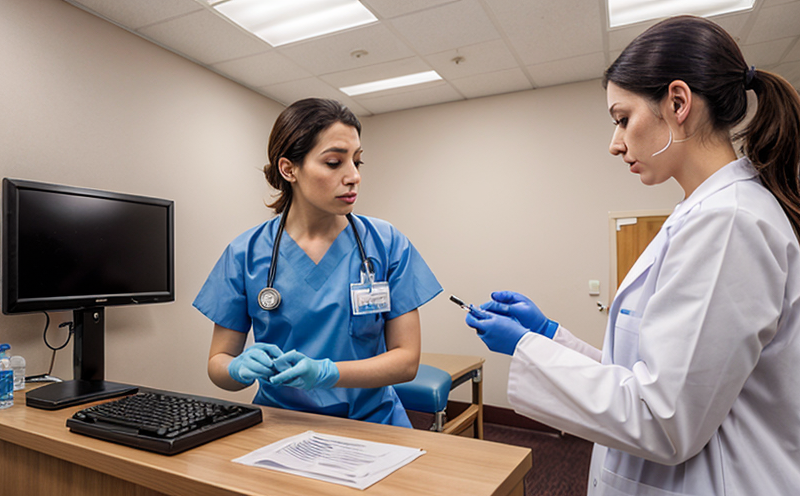Clinical Toxicology & Drug Screening
The field of clinical toxicology and drug screening is crucial in ensuring patient safety and regulatory compliance. This service involves the analysis of biological specimens such as blood, urine, saliva, or hair to detect the presence of drugs, alcohol, or other potentially harmful substances. The primary goal is to identify potential risks that may affect patient care and outcomes.
Clinical toxicology plays a pivotal role in both forensic and therapeutic contexts. In forensic settings, it helps determine the cause of death or assess drug abuse. For therapy, it ensures patients are not exposed to dangerous levels of medication, which could lead to adverse effects. Additionally, this service supports compliance with regulatory standards set by organizations like the World Health Organization (WHO) and International Society for Clinical Toxicology (ISCT).
The process typically begins with specimen collection from the patient or subject. Proper handling and preservation are critical to ensure accuracy in subsequent testing. Specimens are then analyzed using various techniques including chromatography, spectroscopy, and immunoassay methods. The results provide actionable insights that inform treatment decisions.
One of the most common tests within this service is urine drug screening. This test screens for a wide range of substances such as opioids, cannabinoids, cocaine metabolites, benzodiazepines, barbiturates, amphetamines, and others. These screenings are essential in monitoring patient compliance with prescribed medications or identifying illicit substance use.
Another important aspect is the detection of alcohol levels through breathalyzer tests or blood ethanol measurements. This helps in diagnosing alcohol poisoning or assessing a driver's fitness to operate machinery or vehicles under the influence.
The accuracy and reliability of these tests are paramount, which is why they adhere strictly to international standards such as ISO/IEC 17025 for proficiency testing, ensuring that laboratories meet high-quality requirements. This standardization ensures consistency across different facilities worldwide, facilitating accurate diagnosis and effective treatment plans.
| Substance | Test Methodology | Standard Compliance |
|---|---|---|
| Opioids | Gas Chromatography-Mass Spectrometry (GC-MS) | ISO/IEC 17025 |
| Cannabinoids | Spectrophotometry | EN ISO/IEC 17025 |
| Benzodiazepines | High-Performance Liquid Chromatography (HPLC) | ASTM E2394-18a |
| Aminophylline | Enzyme Linked Immunosorbent Assay (ELISA) | IEC 62321:2015 |
The scope of clinical toxicology extends beyond just detecting substances; it also includes evaluating the impact on health and recommending appropriate interventions. By leveraging advanced analytical techniques, this service can provide detailed information about drug metabolism, interactions between different medications, and potential side effects.
Given the critical nature of these tests, reliability is non-negotiable. This is achieved through rigorous quality control measures, continuous staff training, and adherence to stringent safety protocols. Moreover, collaboration with healthcare providers ensures that results are interpreted correctly within broader medical contexts.
Benefits
Clinical toxicology offers numerous benefits across various sectors, including healthcare facilities, pharmaceutical companies, law enforcement agencies, and research institutions. For healthcare providers, it enhances patient safety by identifying adverse drug reactions early on. This proactive approach allows for timely adjustments in treatment protocols, leading to better health outcomes.
Pharmaceutical firms benefit from this service as they can monitor the efficacy of their products while ensuring compliance with regulatory requirements. Law enforcement utilizes these tests during investigations or as part of routine checks at checkpoints or border crossings. Research organizations employ it to study new drug interactions and explore novel therapeutic approaches.
The implementation of clinical toxicology also contributes significantly towards improving public health policies. By gathering comprehensive data on substance abuse trends, policymakers can tailor interventions more effectively, focusing resources where they are most needed.
Moreover, this service fosters trust between patients and healthcare professionals by providing transparent communication regarding treatments. Understanding the full picture allows doctors to make informed decisions about patient care plans. It also reduces unnecessary anxiety among individuals who undergo these tests knowing that they're contributing valuable information towards improving overall public health standards.
Industry Applications
| Application | Description |
|---|---|
| Hospital Settings | Screening for drug use among patients and staff to ensure a safe environment. |
| Forensic Investigations | Determining the cause of death or assessing substance abuse in criminal cases. |
| Patient Monitoring | Tracking medication levels in patients undergoing long-term therapy. |
| Research Laboratories | Evaluating new drug compounds and their potential side effects on human subjects. |
| Pharmaceutical Manufacturing | Verifying the purity of active ingredients before product release. |
| Correctional Facilities | Screening inmates for illegal substance use to maintain order within institutions. |
| Transplantation Units | Ensuring donors are free from substances that could affect organ compatibility. |
The versatility of clinical toxicology extends across multiple industries, making it an indispensable tool in safeguarding public health and ensuring regulatory compliance. Whether applied in hospitals, research labs, or correctional facilities, this service plays a vital role in maintaining integrity and promoting well-being.
Eurolab Advantages
At Eurolab, we pride ourselves on offering unparalleled expertise in clinical toxicology and drug screening. Our state-of-the-art facilities equipped with the latest technology ensure accurate results every time. With a team of experienced professionals who are continuously updated on industry trends, you can trust us to deliver reliable data that supports informed decision-making.
We adhere strictly to international standards such as ISO/IEC 17025 for proficiency testing and IEC 62321:2015 for aminophylline analysis. This commitment guarantees consistency in our processes, enhancing the credibility of our reports.
Our comprehensive approach includes not only the technical aspects but also considerations around patient privacy and data security. We employ robust measures to protect sensitive information while ensuring transparency throughout the testing process.
Besides providing precise analytical results, we offer consultative services tailored specifically to your needs. From specimen collection guidelines to interpretation of findings, our experts are here to guide you every step of the way. This personalized touch ensures that you receive not just test results but also valuable insights into how they can impact your operations or treatments.





